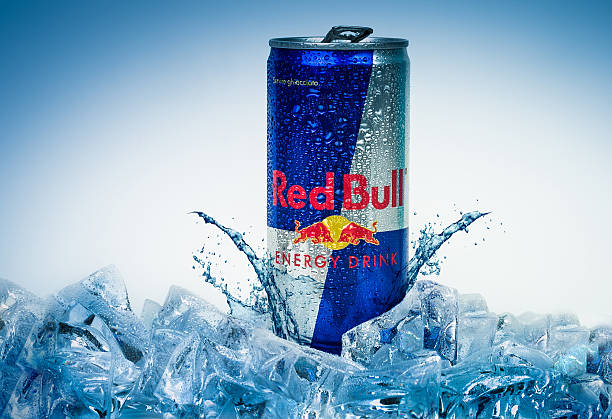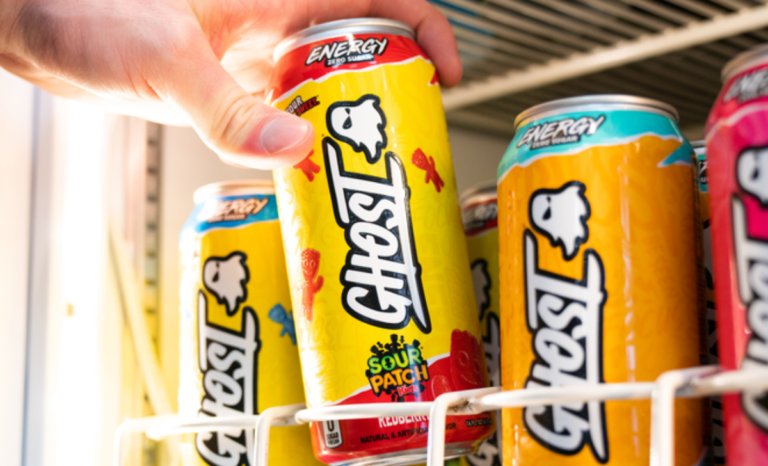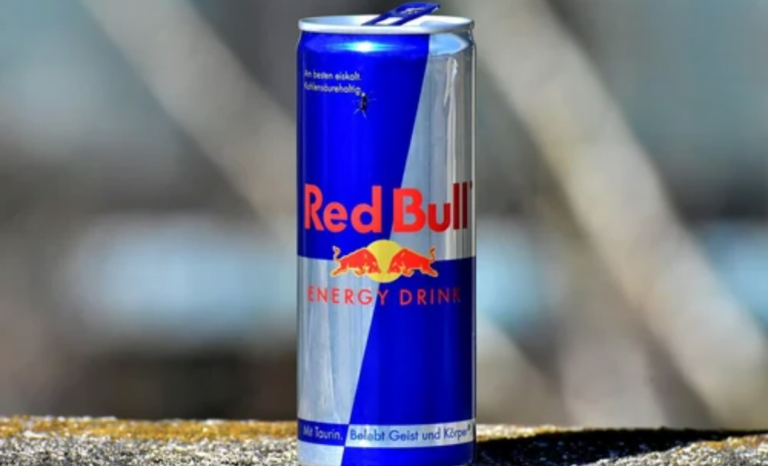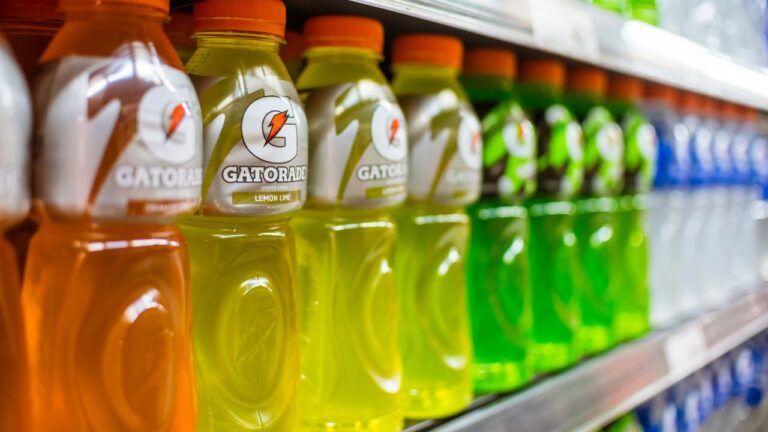The Best Fluffy Pancakes recipe you will fall in love with. Full of tips and tricks to help you make the best pancakes.
Are Celsius drinks bad for your teeth? The relationship between sugar-free energy drinks and dental health is a topic of growing concern.
As these beverages, including popular choices like Celsius, continue to gain popularity, questions arise about their potential impact on our teeth.
In this article, we’ll explore Are sugar-free energy drinks like Celsius bad for your teeth, the science behind why Celsius drinks might be detrimental to dental health. We will delve into ways to enjoy these Sugar-free energy drinks without compromising your oral well-being.
Are Celsius Drinks Bad for Your Teeth?
Sugar-free energy drinks like Celsius may seem like a guilt-free way to get an energy boost, but the effects on your teeth tell a different story.

Consuming beverages with low pH, such as Celsius drinks, alters the oral environment. The acidic content can create an environment where harmful bacteria thrive while compromising the conditions necessary for maintaining optimal oral health. This shift can contribute to an increased risk of dental problems over time.
Here’s your answer to Are Celsius Drinks Bad for Your Teeth.
1. Enamel Erosion
Celsius drinks contribute to enamel erosion, a process that weakens the protective outer layer of the teeth. The acidic nature of these beverages, despite being sugar-free, plays a significant role in breaking down tooth enamel.
Tooth enamel begins to demineralize when exposed to acids, and beverages with low pH levels can accelerate this process.
Over time, frequent consumption can lead to the gradual wearing away of the enamel, making the teeth more vulnerable to decay, sensitivity, and other dental issues.
2. Increased Sensitivity
Enamel erosion caused by Celsius drinks can result in heightened tooth sensitivity. As the protective enamel diminishes, the underlying layers of the teeth become more exposed.
This exposure can lead to increased sensitivity to hot, cold, sweet, or acidic foods and drinks. Individuals may experience discomfort or pain, especially when consuming items that trigger sensitivity.
Read more: Does Celsius Have Alcohol?
3. Cavities and Tooth Decay
The erosion of enamel from Celsius drinks creates an environment conducive to the development of cavities and tooth decay.
With weakened enamel, the protective barrier that shields the teeth from harmful bacteria is compromised. This vulnerability increases the risk of bacterial infiltration, leading to the formation of cavities and the decay of tooth structure.
4. Compromised Tooth Structure
Beyond cavities, the ongoing erosion of enamel from Celsius drinks can result in compromised tooth structure.
Weakened teeth are more prone to chipping, cracking, or breaking, diminishing their overall integrity. This compromise not only affects the aesthetics of the smile but also poses functional challenges, impacting biting and chewing capabilities.
5. Potential Gum Issues
The impact of Celsius drinks extends beyond the teeth to potentially affect the gums. Enamel erosion and compromised tooth structure can contribute to gum problems.
As the teeth weaken, the support for the surrounding gums may be compromised, potentially leading to issues such as gum recession. Gum health is integral to overall oral well-being, and any compromise can have cascading effects.
6. Long-Term Oral Health Consequences
The cumulative effect of enamel erosion, increased sensitivity, cavities, compromised tooth structure, and potential gum issues from Celsius drinks can result in long-term oral health consequences.
Individuals who regularly consume these beverages may find themselves facing a range of dental issues that require intervention, such as dental restorations, fillings, or even more extensive treatments.
Read expert analysis of Are Celsius Energy Drinks Healthy For You
What ingredients in Celsius harm teeth
It’s not just about the absence of sugar; it’s about understanding the overall composition of Celsius drinks and their potential to harm your teeth. So what are ingredients in Celsius drinks bad for your teeth?
While artificial sweeteners replace sugar, the acidic content remains a critical factor in evaluating the impact on dental health.
So, when it comes to Celsius drinks, the answer to the question Are Celsius Drinks Bad for Your Teeth is a resounding yes.
Celsius drinks, like many other beverages, have a pH level that influences their acidity. The pH scale ranges from 0 to 14, with lower values indicating higher acidity.
Celsius drinks typically have a pH ranging from 3.0 to 4.0, placing them firmly in the acidic category. This acidity is largely attributed to ingredients such as citric acid, malic acid, and other acidic components used for flavor enhancement. The low pH levels contribute to the tangy taste of the beverage but also pose a risk to tooth enamel.
Acidic Components
Celsius drinks contain various acidic components that significantly contribute to their potential harm to teeth. The acidity in these beverages is often derived from citric acid, malic acid, and other acidic substances.
While these components enhance the drink’s flavor and shelf life, they can erode tooth enamel when consumed regularly.
Read more: Is Celsius Energy Drink Keto Friendly?
Citric Acid
Citric acid is a common ingredient in Celsius drinks, providing a tangy and refreshing taste. However, citric acid is known to be highly acidic, and prolonged exposure can lead to enamel erosion. The acid interacts with the minerals in tooth enamel, gradually wearing it down over time.
According to NIH, the frequent and excessive consumption of fruits and foods containing citric acid can result in substantial erosion of human tooth enamel.
The paper proposes that these acidic foods, along with those containing other acids, might play a role in various instances of unexplained enamel erosion commonly encountered by dentists.
Malic Acid
Malic acid, another acidic component found in Celsius drinks, contributes to the overall flavor profile. Like citric acid, malic acid can be harsh on tooth enamel. Its acidogenic nature means that it promotes acidity in the oral environment, increasing the risk of enamel erosion and subsequent dental issues.
Sodium Bicarbonate (Baking Soda)
While sodium bicarbonate, commonly known as baking soda, is often considered less acidic, its inclusion in Celsius drinks doesn’t eliminate the overall acidity of the beverage.
Baking soda can neutralize acids to some extent, but its effectiveness in counteracting the acidic impact on teeth may be limited, especially given the presence of other acidic ingredients.
Impact of Artificial Sweeteners
Celsius drinks utilize artificial sweeteners as sugar substitutes to maintain a sweet taste without the detrimental effects of sugar on teeth.
While artificial sweeteners themselves do not directly contribute to tooth decay, they can indirectly affect oral health. Some studies suggest that artificial sweeteners may alter the oral microbiome, potentially influencing the balance of bacteria in the mouth.
According to the NIH, noncaloric sugar substitutes like aspartame, saccharin, and sulfame, as well as caloric bulk sweeteners such as xylitol and sorbitol, have been studied for their impact on dental health.
While intense sweeteners are noncariogenic, bulk sweeteners like xylitol show promise in preventing dental caries.
However, further randomized studies are needed to confirm these findings. The NIH emphasizes the role of special dietary programs and health education in preventing dental diseases associated with sugar.
Did you know Celsius drinks last in your body for 4-6 hours.
Caffeine Content
Celsius drinks are known for their caffeine content, providing consumers with an energy boost. While caffeine itself doesn’t have a direct impact on tooth health, the potential for dehydration is a concern.
Caffeine is a diuretic, meaning it can contribute to increased urine production and potential dehydration. Adequate saliva production is essential for maintaining oral health, and dehydration can reduce saliva flow, impacting the mouth’s ability to neutralize acids and protect teeth.
Note: Energy Drinks like Celsius while breastfeeding are not recommended.
Other Sugar-Free Energy Drinks That Are Bad for Your Teeth
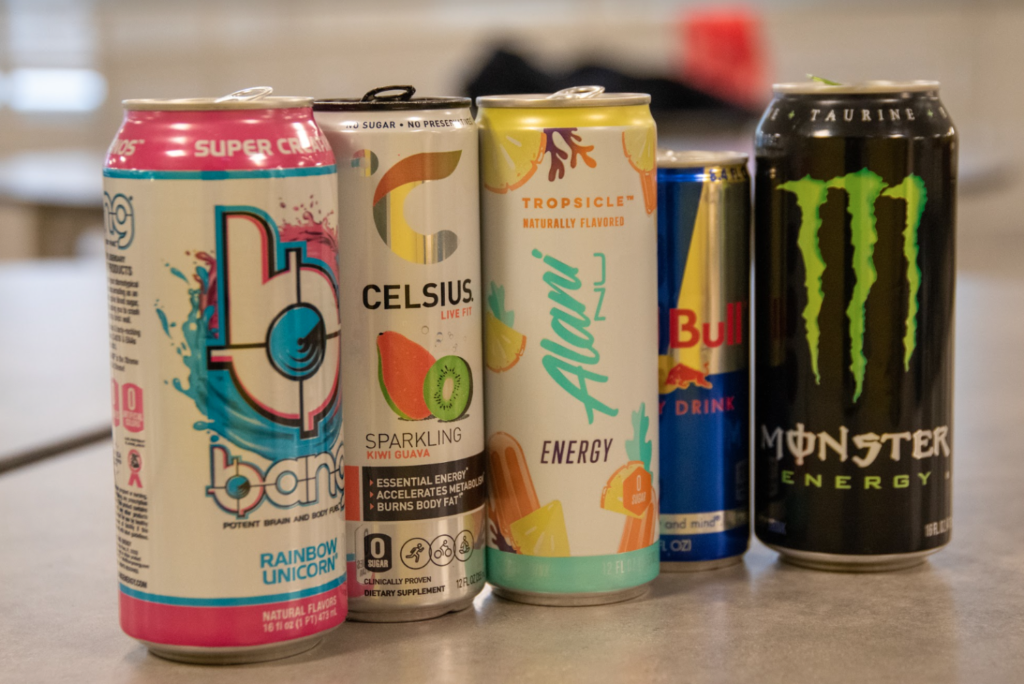
While these sugar-free energy drinks offer a caffeine boost without the added sugars, their acidic nature remains a common factor that can adversely affect dental health.
The risks include enamel erosion, increased tooth sensitivity, potential gum issues, and an elevated risk of cavities and tooth decay.
Sugar-free energy drinks and teeth
The pH levels of various energy drinks are directly related to teeth health as they indicate the acidity of these beverages. The pH scale measures acidity, with lower values indicating higher acidity. In the context of dental health, drinks with low pH levels can be harmful to tooth enamel.
The table comparing pH levels of common energy drinks provides a straightforward way for readers to understand and compare the acidity levels of different beverages.
Higher acidity means a greater potential for enamel erosion, emphasizing the importance of being mindful of the pH levels in the drinks we consume.
pH levels of various common energy drinks:
| Energy Drink | pH Level |
|---|---|
| Celsius | 3.2 |
| Red Bull | 3.4 |
| Monster Zero Ultra | 2.7 |
| Rockstar Sugar-Free | 3.0 |
| 5-hour Energy | 2.9 |
Note: pH values below 7 indicate acidity, and lower pH levels signify higher acidity. This table offers a clear comparison of the acidity levels in different energy drinks.
Here are other Sugar-Free Energy Drinks That Are Bad for Your Teeth.
1. Red Bull Sugarfree
Red Bull Sugarfree may be a go-to choice for those seeking an energy boost without the sugar, but its impact on dental health is noteworthy.
The acidity in Red Bull Sugarfree can lead to enamel erosion, much like Celsius drinks. Regular consumption can contribute to dental problems over time.
The beverage contains citric acid, which, over time, can contribute to the gradual breakdown of tooth enamel. Enamel erosion weakens the teeth and increases susceptibility to decay and sensitivity.
Potential Gum Issues: The acidity in Red Bull Sugarfree can not only impact tooth enamel but may also have implications for gum health. As enamel weakens, the support for the surrounding gums may be compromised, potentially leading to issues like gum recession.
Cavities and Tooth Decay: The acidic nature of Red Bull Sugarfree increases the risk of cavities and tooth decay. Weakened enamel creates an environment where harmful bacteria can thrive, leading to the formation of cavities and the decay of tooth structure.
2. Monster Zero Ultra
Monster Zero Ultra energy drink, another popular sugar-free option, is not exempt from dental concerns.
The acidic nature of the beverage, attributed to ingredients like citric acid, can contribute to the wearing down of tooth enamel over time.
Compromised Tooth Structure: Regular consumption of Monster Zero Ultra may result in compromised tooth structure. Weakened teeth are more susceptible to chipping or breaking, impacting both the aesthetics of the smile and functional aspects like biting and chewing.
Sensitivity Issues: As enamel weakens, increased tooth sensitivity can become an issue with Monster Zero Ultra. Individuals may experience discomfort or pain, particularly when consuming hot, cold, sweet, or acidic foods and drinks.
Understanding the risks associated with this beverage is crucial for those who regularly include it in their routine.
3. Rockstar Sugar-Free
Rockstar Sugar-Free is not only known for its caffeine content but also for its potential impact on teeth. The acidic components in this beverage can compromise tooth enamel, making it essential for consumers to be aware of the dental risks associated with its consumption.
Similar to other sugar-free energy drinks, Rockstar Sugar-Free may pose potential risks to gum health. As enamel weakens, the overall support for the gums may be compromised, contributing to issues such as gum recession.
Did you know Celsius Energy Drinks can Give You Acne Breakouts according to some users
How Can I Drink Energy Drinks Without Damaging My Teeth?

Now you know are sugar-free energy drinks bad for your teeth or not. While the potential risks of sugar-free energy drinks on dental health are evident, there are ways to enjoy these beverages without causing harm to your teeth. Here’s how you can solve sugar-free energy drinks and teeth problem.
1. Moderate Consumption:
When it comes to energy drinks, moderation is key. Limit the frequency and amount of consumption to reduce the prolonged exposure of your teeth to the acidic content present in these beverages.
By spacing out your intake and keeping it within moderate levels, you can help mitigate potential damage to your tooth enamel.
2. Use a Straw:
Drinking energy drinks through a straw can be a simple yet effective strategy to minimize direct contact between the acidic beverage and your teeth.
This reduces the surface area exposed to the damaging acids, providing an extra layer of protection for your enamel.
3. Rinse with Water:
After enjoying an energy drink, make it a habit to rinse your mouth with water. This quick rinse helps neutralize acidity and wash away any residual acids clinging to your teeth.
This proactive step can contribute to safeguarding your teeth from the erosive effects of the drink.
4. Combine with Food:
Rather than consuming energy drinks on an empty stomach, try to have them alongside meals. Food stimulates saliva production, which acts as a natural defense mechanism by neutralizing acids and creating a protective environment for your tooth enamel.
5. Choose Sugar-Free Options:
Opt for sugar-free energy drinks to eliminate the additional risk of tooth decay associated with sugar content.
However, it’s essential to be aware of other acidic components in these beverages that can still contribute to enamel erosion. Checking labels for acidity levels is a prudent practice.
6. Regular Dental Checkups:
Schedule regular dental checkups to monitor your oral health. Dentists can detect early signs of enamel erosion and provide personalized guidance on maintaining healthy teeth.
These checkups are crucial for addressing any emerging issues and ensuring that your oral care routine aligns with the specific needs of your teeth.
7. Wait Before Brushing:
After consuming acidic beverages like energy drinks, it’s advisable to wait at least 30 minutes before brushing your teeth.
The acids in the drink can temporarily soften the enamel, and immediate brushing may exacerbate this softening. Waiting allows the enamel to reharden, minimizing the risk of enamel damage during brushing.
Do you know When Is the Best Time to Drink Celsius Energy Drink
Conclusion: Are sugar-free energy drinks like Celsius bad for your teeth
We hope you have got your answer to Are Celsius Drinks Bad for Your Teeth. The link between sugar-free energy drinks, such as Celsius, and dental health is a critical consideration for consumers.
While the absence of sugar in these beverages may appear to be a healthier choice, the acidic content remains a significant factor contributing to potential dental issues.
Understanding the science behind how these drinks can erode tooth enamel provides valuable insights into the risks associated with their consumption.
Moreover, it’s essential to recognize that Celsius is not the sole offender. Other popular sugar-free energy drinks, including Red Bull Sugar-free, Monster Zero Ultra, and Rockstar Sugar-Free, share similar concerns regarding their impact on dental health. The acidic nature of these beverages can compromise tooth enamel, leading to various dental problems over time.
FAQS: Are sugar-free energy drinks bad for your teeth
Why do energy drinks like Celsius hurt my teeth?
Energy drinks like Celsius can harm teeth due to their high acidity levels. The acidic nature weakens tooth enamel, making it more susceptible to erosion and decay.
Frequent consumption exposes teeth to prolonged acid attacks, contributing to enamel deterioration and potential oral health issues. It is advised to monitor your Celsius drink consumption to avoid health problems.
Do energy drinks weaken enamel?
Yes, energy drinks can weaken enamel. The acidic components, such as citric acid and others, contribute to enamel erosion over time. This weakening makes teeth more vulnerable to sensitivity, cavities, and compromised structural integrity.
Can drinking energy drinks cause cavities?
Yes, drinking energy drinks can contribute to the development of cavities. The high acidity and sugar content in many energy drinks create an environment conducive to the growth of harmful bacteria in the mouth.
These bacteria produce acids that can erode tooth enamel, leading to cavities over time. Regular and excessive consumption of energy drinks increases the risk of dental decay and other oral health issues.
How do energy drinks affect your gums?
Energy drinks, with their high acidity, can negatively impact gum health. The acids in these beverages can irritate and inflame the gums, potentially leading to conditions such as gingivitis. Prolonged exposure may contribute to gum recession and increased sensitivity.
Additionally, the overall oral environment can be altered, creating conditions where harmful bacteria thrive, posing a risk to both teeth and gums.
Maintaining good oral hygiene practices is crucial to mitigate the potential adverse effects of energy drinks on gum health.
Which drinks damage your teeth the most?
Drinks with high acidity levels, such as energy drinks, sodas, and certain fruit juices, can cause significant damage to teeth. The acid content contributes to enamel erosion, leading to increased susceptibility to cavities and other dental issues.
Are energy drinks worse for teeth than soda?
Energy drinks and sodas pose similar risks to dental health due to their high acidity. Both can weaken enamel and contribute to cavities.
The severity depends on the specific formulation and ingredients of each beverage. Regular consumption of either can have detrimental effects on teeth, emphasizing the importance of moderation and adopting preventive oral care practices.
Is one energy drink a day bad for teeth?
Yes, consuming one energy drink daily can be detrimental to teeth. The high acidity and sugar content in many energy drinks contribute to enamel erosion and an increased risk of cavities. Prolonged exposure may lead to long-term dental issues.
Is Monster Zero bad for your teeth?
Yes, Monster Zero, like many energy drinks, can be harmful to teeth due to its high acidity. The acidic nature of the beverage poses a risk of enamel erosion, which may lead to tooth sensitivity, cavities, and compromised dental health.
Is taurine in energy drinks bad for your teeth?
While taurine itself may not directly harm teeth, the overall acidity and other ingredients in energy drinks containing taurine can contribute to enamel erosion. Taurine is not the primary factor; it’s the beverage’s acidic nature that poses a risk to dental health.
Should I brush my teeth after drinking an energy drink?
It’s advisable to wait at least 30 minutes before brushing your teeth after consuming an energy drink. The acids in the drink can temporarily soften the enamel, and immediate brushing may exacerbate this softening. Waiting allows the enamel to reharden, minimizing the risk of enamel damage during brushing.
Does Red Bull cause teeth damage?
Yes, Red Bull and similar energy drinks can cause teeth damage. The high acidity and sugar content contribute to enamel erosion, increasing the risk of cavities, tooth sensitivity, and overall dental issues with regular consumption.
Is sugar-free Red Bull bad for teeth?
While sugar-free Red Bull eliminates the risk of tooth decay associated with added sugars, it can still be harmful due to its acidity.
The acidic components in sugar-free versions can contribute to enamel erosion and other dental problems. Choosing a sugar-free option doesn’t eliminate the potential impact on teeth entirely.
Also Check out: Best Prime Hydration Flavors Ranked from best to worst.


